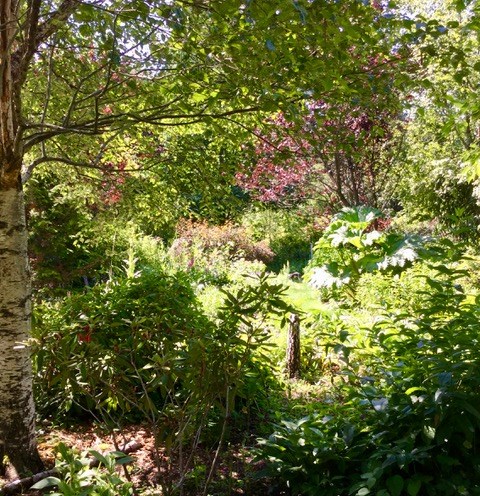A few days ago a fellow Richmond Garden Club member and I led a large group on a tour of Paulik Park, the most secret garden in Richmond.
The group consisted of a majority of people just starting out their careers, some just about ready to step out of the workforce and some in between.
As everyone gathered in the park, there appeared to be a lack of engagement, just polite acquiescence of their circumstance and several stifled yawns.
Our introduction included a historical review of the gardens we were standing in and the forest around us which dates back to the early 1930s. Body language was changing in the group. These folks were leaning in, gazing around them, heads turning at the sounds of nature surrounding them.
We took a stroll through the 1.5 acres of perennial flower beds, 25 of them to be exact. As leaders of the tour, our passion for the park and our immediate evidence of calm and peacefulness began to mirror on everyone’s faces.
Research has shown that gardening has a positive effect on our mental health. For the many hours we volunteers spend in the park kneeling amongst all things green, we can attest to that statement.
Some of the ways gardening seems to be healing, helps us overcome anxiety and lift our spirits include the following:
- Taking care of plants gives us a sense of responsibility. This is a great way to teach children how to look after and respect other living things. It helps us develop an appreciation of the magic of nature.
- Gardening allows us to be nurturers. Plants don’t give a fig who is tending them, whether you are five or 75, male, female, nature is a great equalizer. Those with mental health problems to be able to transform a garden can help boost self-esteem.
- Gardening helps remind us that we are not the centre of the universe. Self-absorption can lead to depression. Focusing on the great outdoors - even pared down to a little patio area - can encourage us to be less insulated.
- Gardening can help us to relax and breathe. Sigmund Freud once stated that flowers are restful to look at. They have no emotions of conflict. Gardening allows us to tap into the carefree part of ourselves with no deadlines, money worries or bosses to worry about. The rhythmic nature of the many tasks associated with gardening such as weeding, trimming, digging and planting, allows thoughts to ebb and flow throughout all of our movements.
- And finally, working in nature releases our happy hormones. It is obvious that gardening is great exercise but understanding that is also extremely beneficial for our minds is important to overall health. Science shows that when you are deeply immersed in gardening, levels of serotonin and dopamine (hormones that make us feel so good) rise and the level of cortisol (a hormone related to stress), is lowered.
By the end of our 30 minutes together, we found a work-tired, noticeably stressed group of people wandering right into the garden beds, gazing up into the almost 100 year old stately trees, stopping to watch the plethora of swallowtail butterflies busy being butterflies and touching and feeling the nature all around them. My partner and I silently said to ourselves, “Nailed it!” We gave them a half an hour of healing and they understood what was happening to them.
Stop by the most beautiful park in the city of Richmond and breathe.
Lynda Pasacreta is the current president of the Richmond Garden Club. Paulik Park was adopted by Richmond Garden Club in 2008. Volunteers from the Garden Club and the community at large maintain the beautiful “almost 100 year old” gardens. Paulik Park is located in the 7600 block of Heather Street just north of Blundell Road. Visit richmondgardenclub.ca for more information.



